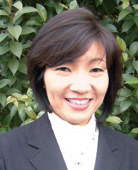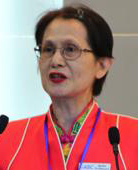You are here
CUE ESP Symposium 2017 - Plenary Speakers
For more information: espsymposium@gmail.com

Developing Academic Literacy and Business Communication Skills in English through Genre-based Approaches for Japanese Science Majors
Masako Terui, Associate Professor in the Department of General Education, Faculty of Science and Engineering, at Kindai University, Japan
Abstract: Effective English education is a must, even for those in science and technology fields, to keep in pace with the rapid expansion of globalization in business fields and also to maintain Japan’s position in science and technology. In today’s multilingual and multicultural contexts, a high level of English proficiency is required for communication with colleagues and business/research partners. However, the level of Japanese university students is still lacking in field-specific communicative competencies. To aim for effective English education in Japan today, we need to strike a good balance between ESP’s two main areas: English for Academic purposes (EAP) and English for Occupational Purposes (EOP), including English for Business Purposes (EBP). My talk will examine the similarities and differences of EAP and EBP in some detail with a special focus on the concepts of "genre" by Swales. I will provide examples from my class application of EAP to undergraduate and graduate students in science as well as from research findings in EBP, revealing how English is actually used among Japanese businesspersons in today’s era of globalization.
Masako Terui is an Associate Professor in the Department of General Education, Faculty of Science and Engineering, at Kindai University, Japan. Her research interests include English for science and engineering students, focusing on the genre-analysis-based approach and information and communication technology (ICT), as well as English for Business Purposes. She was Chair of Japan Association of College English Teachers (JACET) Kansai ESP SIG from 2013 to 2014. Her recent publications include Towards a robust, genre-based translation model and its application, in the Handbook of Japanese Applied Linguistics (Mouton De Gruyter); English for Japanese science and engineering majors in the age of globalization, in the Journal of Japan Business Association; and Questionnaire Survey on Business Meetings: English Proficiency and Difficulty, in JACET Selected Papers.

Adapting American-Based Management and Business Communication Courses to the Asian and Middle Eastern Environments
Bertha Du-Babcock, Associate Head and Associate Professor in the Department of English at City University of Hong Kong
Abstract: Western professors draw on theory and teaching material that were developed largely from observing US business practice in designing and delivering management, organizational behavior, and business communication courses to American business school students. These US delivered courses that are imbedded in the language (English), culture (individualistic), and content (geography, legal system, infrastructure) of the United States need to be adapted to fit the Asian or Middle Eastern classrooms in order to account for non- native English speaking students, collectivistic cultures, and contexts that are vastly different from the United States. To collect data, I identified and obtained the cooperation of ten expert Western professors who have taught in Hong Kong, Japan, Mainland China, India, United Arab Emirates, Egypt, and Singapore. The data for the presentation were gathered through a triangulation method including objectifying interviewing and the written responses to open-ended questions.
In this presentation, I first outline why Western professors need to adjust when teaching in Asia or the Middle East. I then describe and compare the adjustments in seven Asian and Middle Eastern countries. Areas of adaptation included course materials, in-class and out of class interaction with students and administrators, and personal adjustments. I conclude by filtering out universal adjustments that apply to all teaching situations and specific adjustment factors that apply in different countries, in short- term and long- term teaching assignments, and by course type. I also discuss how environmental factors influenced personal adjustment.
The findings of the study demonstrate that the instructional material and teaching style used in the United States could serve as the framework for Asian and middle east teaching but that adaptations needed to be made for language, culture, and context differences in and among Asian and middle eastern countries. The English competency of the students determine the quantity of teaching material that could be presented and language, culture, and context the overall nature of the adaptations.
Bertha Du-Babcock is Associate Head and Associate Professor in the Department of English at City University of Hong Kong. She is a member of the Executive Committee for the Association for Business Communication. She served as President (October 2015 - December 2016), as a member of the Board of Directors-At-Large (2007 – 2009), and as the Vice President for the Asia and the Pacific Region (2009 – 2014). She was distinguished as Fellow of the Association (2016), and received the Distinguished Member (2010), the Kitty O Locker Outstanding Researcher (2008), the Meada Gibbs Outstanding Teaching Award (2004), and the Outstanding Article Award (2007 and 2001). She co-edited a special issue for the Journal of Business and Technical Communication, and is a co-author of the Asian Edition of Essentials of Business Communication.

Ethnographic Perspectives on ESP Research
Sue Starfield, Professor in the School of Education and Director of The Learning Centre at the University of New South Wales, Australia
Abstract: While there is a growing interest in ethnographic research in applied linguistics more broadly, there are, however, fewer accounts of ethnographic research in the area of English for specific purposes. In my talk, I will provide an overview of the basic characteristics of ethnographically-oriented research, including critical ethnography, and will then discuss research techniques that are typically drawn on in this kind of research. I will continue by reviewing examples of ethnographically-oriented studies that have been conducted in the area of English for specific purposes, including critically-focused studies. I will conclude by making recommendations for practice as well as providing suggestions for future ethnographically-oriented research in the area of English for specific purposes.
Sue Starfield is a Professor in the School of Education and Director of The Learning Centre at the University of New South Wales, Australia. Her research and publications cover tertiary academic literacies, doctoral writing, writing for publication, identity in academic writing, ethnographic research methods and language policy, access and equity in higher education. She was co-editor of the journal, English for Specific Purposes (2009-2014) and is co-editor with Brian Paltridge of two new book series with Routledge: Routledge Introductions to English for Specific Purposes and Routledge Research in English for Specific Purposes. Her most recent publication is Ethnographic Perspectives on Academic Writing (2016, Oxford University Press) co-authored with Brian Paltridge and Christine Tardy.
Theme by Danetsoft and Danang Probo Sayekti inspired by Maksimer
